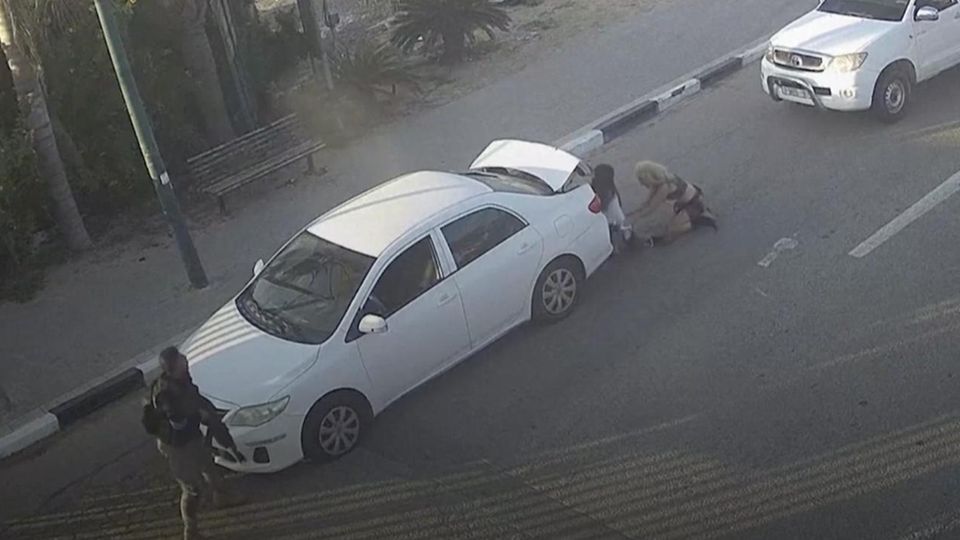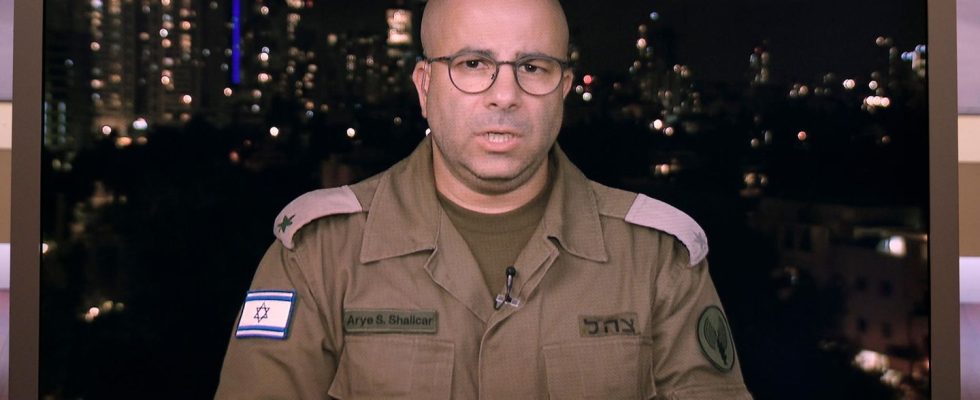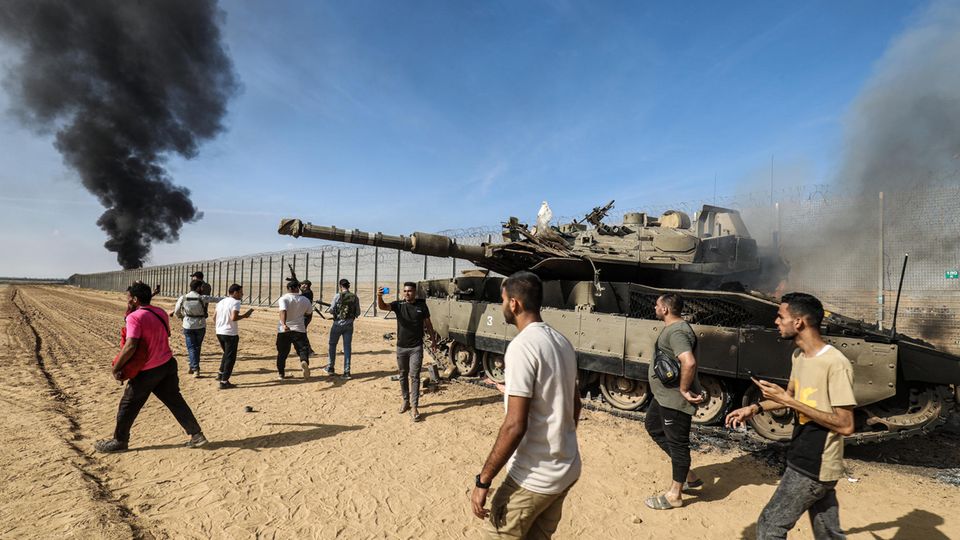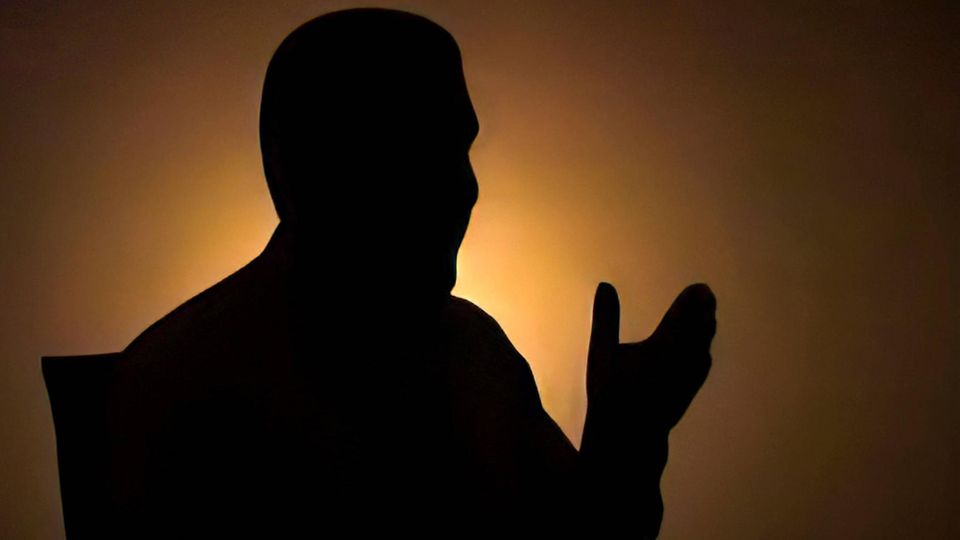Talk at “Anne Will”
Middle East conflagration? Guests discuss terror in Israel – but the show has a weakness
Arye Sharuz Shalicar, spokesman for the Israeli military, in a TV talk on “Anne Will”
© Wolfgang Borrs / NDR
“Is there a risk of a conflagration in the Middle East?” Anne Will asked the guests on her show. The very expert panel had no easy answers to the terror in Israel. And there was a voice missing from the cast.
Israel has been in shock for a week. That’s what Israeli military spokesman Arye Sharuz Shalicar said on “Anne Will.” The current conflict is “the new Yom Kippur War” of his generation, which he will tell his descendants about, he said, summing up the bewilderment, sadness and emotions that Hamas’ terrorist attack on Israel had triggered. Anne Will presented her program with the somewhat larger question “After the terrorist attack on Israel – is there a risk of a conflagration in the Middle East?”
Guests at “Anne Will” were:
- Natalie Amiri, journalist, headed the ARD studio in Tehran from 2015 to 2020
- Kevin Kühnert (SPD), Secretary General
- Michael Wolffsohn, historian and journalist
- Gerhard Conrad, former BND official specializing in the Middle East
- Arye Sharuz Shalicar, Israeli military spokesman
- In the previously recorded interview: Annalena Baerbock (Alliance 90/The Greens), Federal Minister of Foreign Affairs
The aim of Israel’s ground offensive in the Gaza Strip is explicitly not to kill civilians, but rather to “destroy Hamas,” military spokesman Shalicar explained in the broadcast. In order to avoid civilian casualties, Palestinians living in the Gaza Strip would have to head south. Because if people don’t leave, that would primarily be an advantage for Hamas. This would then use images of killed civilians, including many women, children and old people, in the media. All of the guests sitting in Anne Will’s studio agreed with this statement from Shalicar, who was speaking from Israel.
If Hamas were to use “images of bleeding children” for its own purposes, solidarity with Israel could be overturned, said journalist Natalie Amiri. It can be assumed that an Israeli ground offensive will last not just two or three days, but weeks. Children are being used by Hamas as living shields, the journalist continued, explaining together with the others in the group that it is not the Palestinians who are the target of a ground offensive, but the terrorist organization Hamas.
Middle East crisis
Hamas attacks Israel – a chronicle of events in pictures
Annalena Baerbock on “Anne Will”: Israel will get all the help
Anne Will conducted an interview with Foreign Minister Annalena Baerbock before the live broadcast. The Green politician explained that there had been talks with Egypt that had not yet been successful. The Foreign Ministry has not yet been able to establish contact with the German hostages. “Any help that Israel needs will come from Germany,” said Baerbock, who meant both military and psychological help for the many families affected by terror. The Foreign Minister reported very impressively about a man whose wife and children were kidnapped by Hamas. “That could be all of us,” she warned and explained: “The core of this catastrophe is the terror of Hamas.” This terror must be fought.

“Anne Will” would have benefited from a Palestinian voice
The program also discussed the extent to which a ground offensive by Israel would be in accordance with international law – also in view of the fact that although it is currently said that the southern Gaza Strip is safer for the civilian population, Hamas is preventing people from doing so to get to part. Historian Michael Wolffsohn explained: “International law is ideally suited to combating aphids.” In this situation it is only theoretically applicable, the practice is currently different. “The law of war is murder and manslaughter.” SPD General Secretary Kevin Kühnert interjected that international law also works by being talked about.
What was sadly missing from the expert panel was a representative of the Palestinian side. There are certainly Palestinians who reject Hamas’ terror and are worried about their compatriots. They could have reported what life in the Gaza Strip is currently like. Even though Natalie Amiri explained in the broadcast that Hamas is doing everything to ensure that there is no independent reporting from the Gaza Strip.
The panel was divided on the question of a possible wildfire in the region. Everyone agreed that the situation was dangerous and that Iran was currently the political winner. “I don’t think Iran has any interest in it becoming a conflagration. But they’re setting things off pretty well,” Amiri said, summing up the situation, but also said that this primarily affects the regime. The population is “on the side of peace.” Amiri called for a rethink of Iran policy. “The nuclear agreement has failed. Why is the government still being kept happy with appeasement policies?” she asked.
Further topics:
- Talk to Hamas? The expert Conrad explained that, in his view, talks with the Hamas leadership in Qatar or Turkey would achieve nothing because the political and military leadership in Gaza acts independently of them.
- Alternative to the ground offensive? Michael Wolffsohn considers a ground offensive to be “a political and military mistake.” In his opinion, there should be a more “elegant” solution, which above all requires that local partners take part.
- Did Germany finance Hamas? After the interview with the Foreign Minister, Wolffsohn raised the question of whether the “brutality” of Hamas had not been “co-financed by us.” He would have missed “self-criticism of this and the previous government” on this point in the interview. Kühnert stated that the Palestine portfolio was the one that would be best reviewed, but that it could not be ruled out that aid had been diverted. Shalicar was quite clear on this point and reported that aid from Germany did not support the civilian population, but rather paid Hamas fighters and their families.



